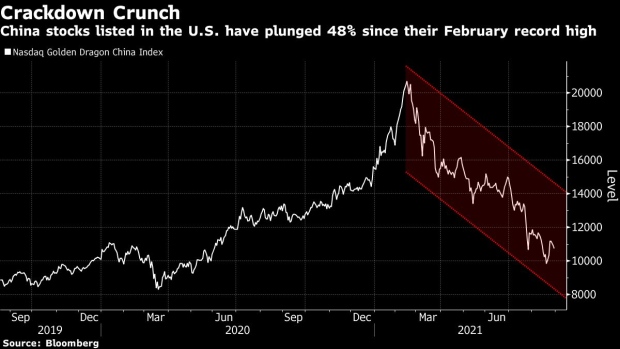Aug 30, 2021
China Game Stocks in U.S. Fall on Beijing’s Latest Crackdown
, Bloomberg News

(Bloomberg) -- Chinese gaming stocks listed in the U.S. are under pressure once again after regulators in Beijing cut back the amount of time children can play online each week to just three hours.
American depositary receipts of gaming giant NetEase Inc. plunged as much as 8.8% Monday, while Tencent Holdings Ltd. -- which gets about a third of its revenue from video games -- dropped 2.8%. Other gaming-related stocks were also lower with Bilibili Inc. sinking 5.7% and Kingsoft Cloud Holdings Ltd. sliding 5.9%.
The latest rules will only allow gaming platforms to offer services to minors from 8 p.m. to 9 p.m. on Fridays, weekends and public holidays, according to state news agency Xinhua, which cited a release by the National Press and Publication Administration. China had previously restricted gaming hours for teens to 1.5 hours per day in 2019.
“Tencent, NetEase and other online games companies in China may experience merely a modest hit” due to the measures, according to Bloomberg Intelligence analyst Matthew Kanterman. “Players under 16 accounted for just 2.6% of Tencent’s domestic gross game spending in 2Q.”
Still, the rollout of compliance measures could hit near-term margins, Kanterman added.
This marks the second time in less than a month that China’s gaming stocks have been targeted as part of the nation’s broader crackdown on industries ranging from technology giants to after-school tutoring companies.
Gaming ADRs also tumbled in early August after state media published a scathing article that called online games “spiritual opium” and “electronic drugs.” While those references were later stripped out from the story, Tencent still responded by pledging to limit play time for teens and said it would ban in-game purchases for under 12-year-olds.
The Nasdaq Golden Dragon China Index -- which tracks 98 firms listed in the U.S. that conduct a majority of their business in China -- fell for a third consecutive session on Monday, losing as much as 1.8%. The gauge has dropped more than 30% this year, including about 48% since its record high in February.
While Beijing’s latest clampdown has clearly spooked investors, some analysts say the risks are relatively low.
“It is worth noting that teenagers are not the main revenue source for gaming companies,” said Jessica Tea, an investment specialist for greater China equities at BNP Paribas Asset Management Asia Ltd. “We think the regulation impact is relatively under control.”
(Updates to add chart, details on Nasdaq Golden Dragon China Index and pricing throughout)
©2021 Bloomberg L.P.





